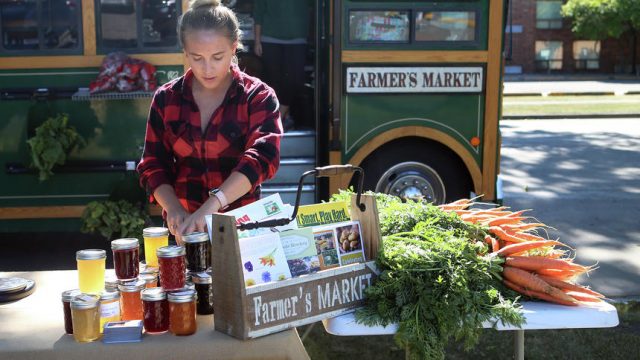The Legislature Should Leave “Cottage Foods” Alone

Brooke Riendeau sets up produce and preserves at the Mobile Farmer's Market outside of the YMCA Tuesday. photo by Eric Hylden/Grand Forks Herald
During the 2017 legislative session lawmakers passed HB1433, introduced by Rep. Luke Simons (R-Dickinson), which supporters called the “food freedom act.”
Essentially what it did was create a permissive regulatory framework allowing for direct-to-consumer food sales. The law refers to this as “cottage foods.” Basically the sort of thing you’d see at bake sales, only operated as a business.
These foods might not be everyone’s cup of tea, but as far as I’m concerned if everyone buying the food understands what they’re getting, let’s live and let live.
But now during the 2019 session there is legislation to crack down on cottage foods. SB2269, introduced by Senator Jerry Klein (R-Fessenden), would put in place a lot of new restrictions that “cottage food” supporters say will make their activities all but impossible.
Baylen Linnekin, writing at Reason, has more:
Under the pretense of “clarifying” the Food Freedom Act, S.B. 2269 would greatly limit the rights of food producers seeking to take advantage of the existing law. For example, S.B. 2269 would outlaw many homemade foods that are now legal to sell—including everything from lemonade to chicken tamales to canned beets. It would require foods that require refrigeration—from many pies to fruit salad—to be transported frozen and sold either dehydrated or frozen, which would make many foods inedible! It would also allow local health departments to inspect produce sold to restaurants. None of these onerous new regulatory burdens exist under the current law.
“It hopes to create a sense of comfort amongst the health department—who had a lot of concerns—and the cottage food industry,” Senator Klein told the Bismarck Tribune. “And together, I believe I have a bill that is workable for all parties involved.”
But it might be worth noting that Klein is a former grocer. At one time he was the head of the North Dakota Grocer’s Association.
And who is opposed to this food freedom legislation? The North Dakota grocery industry. In a newsletter last year the NDGA said they were “apposed [sic] this bill and will work with the ND Department of Health to fix or repeal this legislation.”
The grocery business is tough. Margins are slim. One might be tempted to be sympathetic toward grocers – particularly small-town operations which are both necessary to the success of their communities but also increasingly becoming extinct. Even losing out a thousand dollars a month because your customers are buying cottage foods instead of your offerings can be tough medicine for a grocery store owner.
All that being said, it is unwise to protect incumbent businesses from competition. Sometimes the status quo needs disruption.
Klein’s bill seems less an attempt to apply prudent regulation to an emerging business model than a way to kneecap the competition.
I might be willing to revisit the idea of regulating cottage foods in the future, but our current law was just put in place last legislative session. I don’t think we’ve had enough time to say whether additional policy changes are needed or not.




